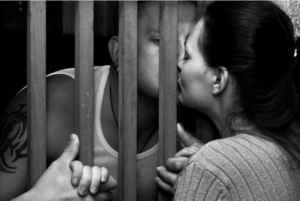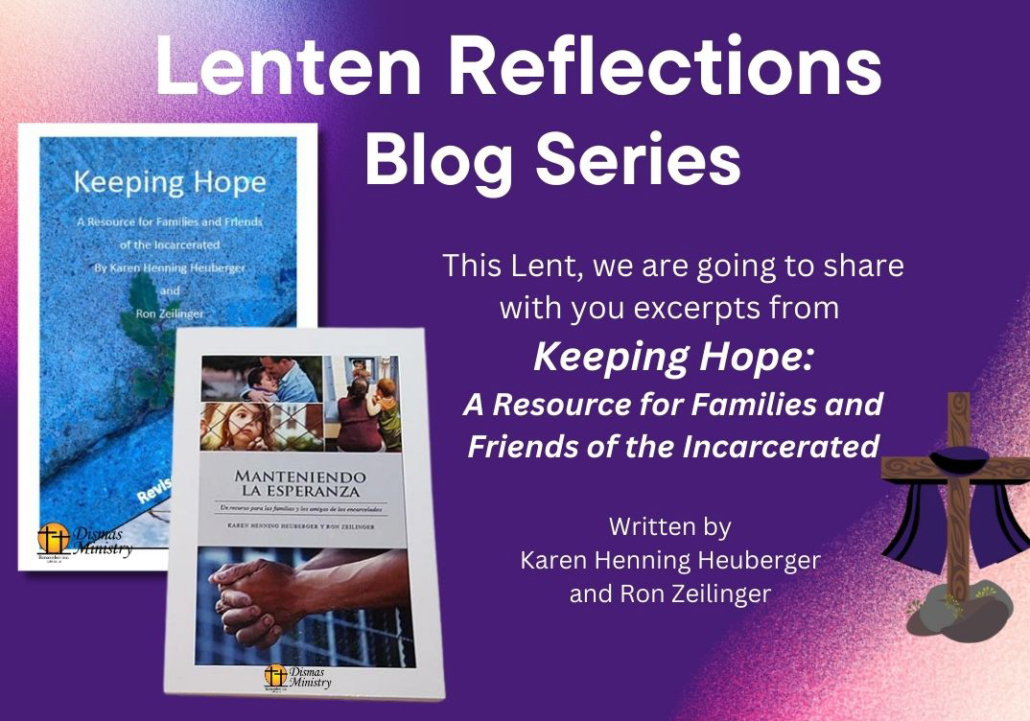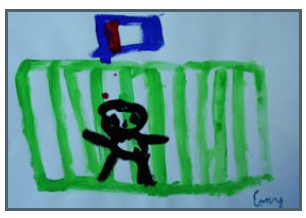This Lent, we are going to share with you excerpts from Keeping Hope: A Resource for Families and Friends of the Incarcerated
Written by Karen Henning Heuberger and Ron Zeilinger
“Facing the Challenges: Living Day-to-Day”
Whether it is a child, a spouse, or a parent, having an incarcerated family member presents many day-to-day challenges, especially if he or she was a member of your household at the time of the incarceration.
For those whose loved one was the primary source of income, the financial burdens may be the greatest source of stress. Adjusting to one income, or joining the workforce to make ends meet, may take more than creative accounting. In addition to loss of income, the person is still in your budget if you commit to continuing to care for him or her. There is the expense of phone calls, whether you pay for collect calls or put money in your loved one’s phone account.
 There is also the money that goes into his or her account for personal expenses at the prison commissary. Your loved one may need money for shoes, underwear, certain clothes, extra food, toiletries, paper and pens for classwork assignments or writing letters, and anything the prison doesn’t supply. Some have said that they budget $300 per month for the basics for their loved one.
There is also the money that goes into his or her account for personal expenses at the prison commissary. Your loved one may need money for shoes, underwear, certain clothes, extra food, toiletries, paper and pens for classwork assignments or writing letters, and anything the prison doesn’t supply. Some have said that they budget $300 per month for the basics for their loved one.
And as mentioned in Chapter Three, visiting adds even more expenses. If you travel a distance, there is the expense for gas, hotel, and food. Even if it is simply a day-trip, you will probably need to pay for food, whether in the prison or on the road.
While you may be able to support yourself and/or your family with your own job, you may not be able to live the same lifestyle you were used to before your support provider was incarcerated. You may have to make tough decisions, like not going to visit your loved one, because of the expense. You may have to move or make other big changes in your lifestyle to make ends meet. You may struggle to pay your bills and find you need to tap public resources, your place of worship, or reach out to family and friends for financial help.
 Bills that are in your name, or held jointly with the offender, will remain your responsibility. Bills in the offender’s name, such as credit card accounts, are your loved one’s responsibility, not yours. Do not be hassled by banks or lenders to pay them. The one incarcerated will have to make arrangements for those. Since he or she has no income bankruptcy is often the only solution.
Bills that are in your name, or held jointly with the offender, will remain your responsibility. Bills in the offender’s name, such as credit card accounts, are your loved one’s responsibility, not yours. Do not be hassled by banks or lenders to pay them. The one incarcerated will have to make arrangements for those. Since he or she has no income bankruptcy is often the only solution.

If you are a parent and your spouse is incarcerated, you may have to find new child care arrangements so you can work. Even if it isn’t your spouse who is incarcerated, you may find yourself taking care of your grandchildren, nieces and nephews, or other children if their imprisoned former caregiver has no one to care for these children.
Elderly grandparents can be burdened because of the energy it takes to raise young children. Or they may not be able to retire due to the expense of raising children. When you have a family of your own and are taking in the prisoner’s children, you may have to deal with how your own children will respond and how additional children in the home may affect your relationships. You will have the added expense of raising the additional children and may receive little financial support for this expense.
In addition to financial burdens are the emotional stressors. You may worry about your loved one’s well-being, whether physical, emotional, or spiritual. Even if you have a close relationship with this person, you may have weeks when you aren’t getting along, so visits and correspondence may be affected. Your emotional life may reflect that – you are up when your loved one is up, and down when that person is down.
You may also lose emotional support if people “drop out” of your life after the incarceration. Family members may respond differently to the situation and this can cause hurt and tension. Parents of inmates may blame themselves or each other, and this puts stress on their relationship. Some couples separate just to avoid having to deal with the stress. To help avoid this, couples need to realize they are still important to each other and make sure that having a child in prison is not the only focus in their lives. Supportive loved ones may also have to deal with the fact that even within the immediate family, all members may not be sympathetic to the one in prison, or even have anything to do with you or the one imprisoned. Incarceration is a trauma for so many whose lives are touched by this tragedy.
When a loved one is incarcerated, it changes family dynamics. Roles may change as a spouse becomes a “single” parent. This may be the hardest challenge of all. You lose daily emotional support and intimacy if it is your spouse who is incarcerated. Decision-making and discipline are all on your shoulders. This can lead to resentment if the prisoner, at visits, acts as if he or she is still in charge of these things.
 Children lose the daily support of a parent or significant adult as well. They may have to take on added responsibilities around the house which can result in resentment. They may feel abandoned or responsible for the incarceration and act out, either at home or at school. If any form of bullying occurs, instruct your children to report it to school authorities immediately before it escalates into violence.
Children lose the daily support of a parent or significant adult as well. They may have to take on added responsibilities around the house which can result in resentment. They may feel abandoned or responsible for the incarceration and act out, either at home or at school. If any form of bullying occurs, instruct your children to report it to school authorities immediately before it escalates into violence.
During your loved one’s incarceration, you are missing a piece of your family unit. The prisoner may miss family weddings, graduations, or funerals and other important events. Even when good things happen in your life, the incarceration is still hanging over your head, coloring the experiences of your life. You may also worry how the incarceration will affect the inmate in the long run, and may need to learn to let go of your hopes and dreams for and with that person, accepting it for what it is.
 From Those Who Know…
From Those Who Know…
I didn’t realize how much we shared around the house, like bouncing ideas off of him, or just getting a ride to get my oil changed.
I maxed out my credit cards making sure he had money on his phone account.
I had to move in with my in-laws and sell the second car.
My husband got military disability and I wasn’t sure if this would continue. I had to go through an appeal process. It was uncertain for the first several months.
I have a low-level anger toward my mom because of how she hasn’t dealt with my sister’s situation.
We almost split up.
In spite of all that happened, it was a blessing because my perspective changed. It forced me to change my priorities.

READ MORE FROM KEEPING HOPE BY PURCHASING YOUR COPY ON OUR STORE PAGE.

 Other facilities do not provide these features. Depending on the security level or other factors, children may not be able to touch their loved one. The visit may be through glass or over a video screen. However the children connect with their loved one in a visit, prepare them ahead of time so they know what to expect.
Other facilities do not provide these features. Depending on the security level or other factors, children may not be able to touch their loved one. The visit may be through glass or over a video screen. However the children connect with their loved one in a visit, prepare them ahead of time so they know what to expect.

 Never speaking ill of the incarcerated helps the children maintain any positive emotions they have for their loved one. Also, when children see the adults forgive the family member, it can help them do likewise. Never pressure the children to move to forgiveness or even positive feelings for the loved one. Allow them to experience what they are feeling and then address their feelings through positive means.
Never speaking ill of the incarcerated helps the children maintain any positive emotions they have for their loved one. Also, when children see the adults forgive the family member, it can help them do likewise. Never pressure the children to move to forgiveness or even positive feelings for the loved one. Allow them to experience what they are feeling and then address their feelings through positive means.
 Another program providing information and activities for children as well as advice for caregivers and service providers is Sesame Street’s new project, Little Children, Big Challenges: Incarceration (www.sesamestreet.org/toolkits/incarceration). In the usual Sesame Street style, this program uses videos, songs, and activities for children ages 3-8 to help them understand and deal with the challenges of having a loved one who is incarcerated. Big Brothers/Big Sisters and church programs can also offer support, providing mentors and involvement in positive ways. Programs such as these move the children’s focus away from the reminders of their loved one’s incarceration.
Another program providing information and activities for children as well as advice for caregivers and service providers is Sesame Street’s new project, Little Children, Big Challenges: Incarceration (www.sesamestreet.org/toolkits/incarceration). In the usual Sesame Street style, this program uses videos, songs, and activities for children ages 3-8 to help them understand and deal with the challenges of having a loved one who is incarcerated. Big Brothers/Big Sisters and church programs can also offer support, providing mentors and involvement in positive ways. Programs such as these move the children’s focus away from the reminders of their loved one’s incarceration. There is also the money that goes into his or her account for personal expenses at the prison commissary. Your loved one may need money for shoes, underwear, certain clothes, extra food, toiletries, paper and pens for classwork assignments or writing letters, and anything the prison doesn’t supply. Some have said that they budget $300 per month for the basics for their loved one.
There is also the money that goes into his or her account for personal expenses at the prison commissary. Your loved one may need money for shoes, underwear, certain clothes, extra food, toiletries, paper and pens for classwork assignments or writing letters, and anything the prison doesn’t supply. Some have said that they budget $300 per month for the basics for their loved one. Bills that are in your name, or held jointly with the offender, will remain your responsibility. Bills in the offender’s name, such as credit card accounts, are your loved one’s responsibility, not yours. Do not be hassled by banks or lenders to pay them. The one incarcerated will have to make arrangements for those. Since he or she has no income bankruptcy is often the only solution.
Bills that are in your name, or held jointly with the offender, will remain your responsibility. Bills in the offender’s name, such as credit card accounts, are your loved one’s responsibility, not yours. Do not be hassled by banks or lenders to pay them. The one incarcerated will have to make arrangements for those. Since he or she has no income bankruptcy is often the only solution.
 Children lose the daily support of a parent or significant adult as well. They may have to take on added responsibilities around the house which can result in resentment. They may feel abandoned or responsible for the incarceration and act out, either at home or at school. If any form of bullying occurs, instruct your children to report it to school authorities immediately before it escalates into violence.
Children lose the daily support of a parent or significant adult as well. They may have to take on added responsibilities around the house which can result in resentment. They may feel abandoned or responsible for the incarceration and act out, either at home or at school. If any form of bullying occurs, instruct your children to report it to school authorities immediately before it escalates into violence. From Those Who Know…
From Those Who Know… 
 You may be able to visit your loved one each week, or at least 2-3 times a month. Or you may visit only a few times a year due to travel and time constraints. For some of you, the distance may prevent you from visiting at all. When you do visit, if you are able, the main thing is to make the most of it and keep the conversation in a positive vein. You may have to find ways to keep your emotions in check, especially if you are angry with your loved one. In the early visits, you may want to know the truth of what happened when the crime was committed. Why did he or she do it? The truth is, sometimes your loved one may not even know. He or she may also play the “blame game” and may not be ready to take full responsibility. Or your loved one may be careful with what is shared so as not to hurt you. Don’t push your loved one to share. You may not know the emotional state your loved one will be in before you visit, so you need to be prepared for uncertainty during the visit. Over time, visiting usually gets easier. Keep your loved one up-to-date on family events, find ways to bring humor and to laugh, and be sure to express your love in some way. You can grow closer to your loved one during these visits. You can become your loved one’s true support person even if you have not been in the past.
You may be able to visit your loved one each week, or at least 2-3 times a month. Or you may visit only a few times a year due to travel and time constraints. For some of you, the distance may prevent you from visiting at all. When you do visit, if you are able, the main thing is to make the most of it and keep the conversation in a positive vein. You may have to find ways to keep your emotions in check, especially if you are angry with your loved one. In the early visits, you may want to know the truth of what happened when the crime was committed. Why did he or she do it? The truth is, sometimes your loved one may not even know. He or she may also play the “blame game” and may not be ready to take full responsibility. Or your loved one may be careful with what is shared so as not to hurt you. Don’t push your loved one to share. You may not know the emotional state your loved one will be in before you visit, so you need to be prepared for uncertainty during the visit. Over time, visiting usually gets easier. Keep your loved one up-to-date on family events, find ways to bring humor and to laugh, and be sure to express your love in some way. You can grow closer to your loved one during these visits. You can become your loved one’s true support person even if you have not been in the past.